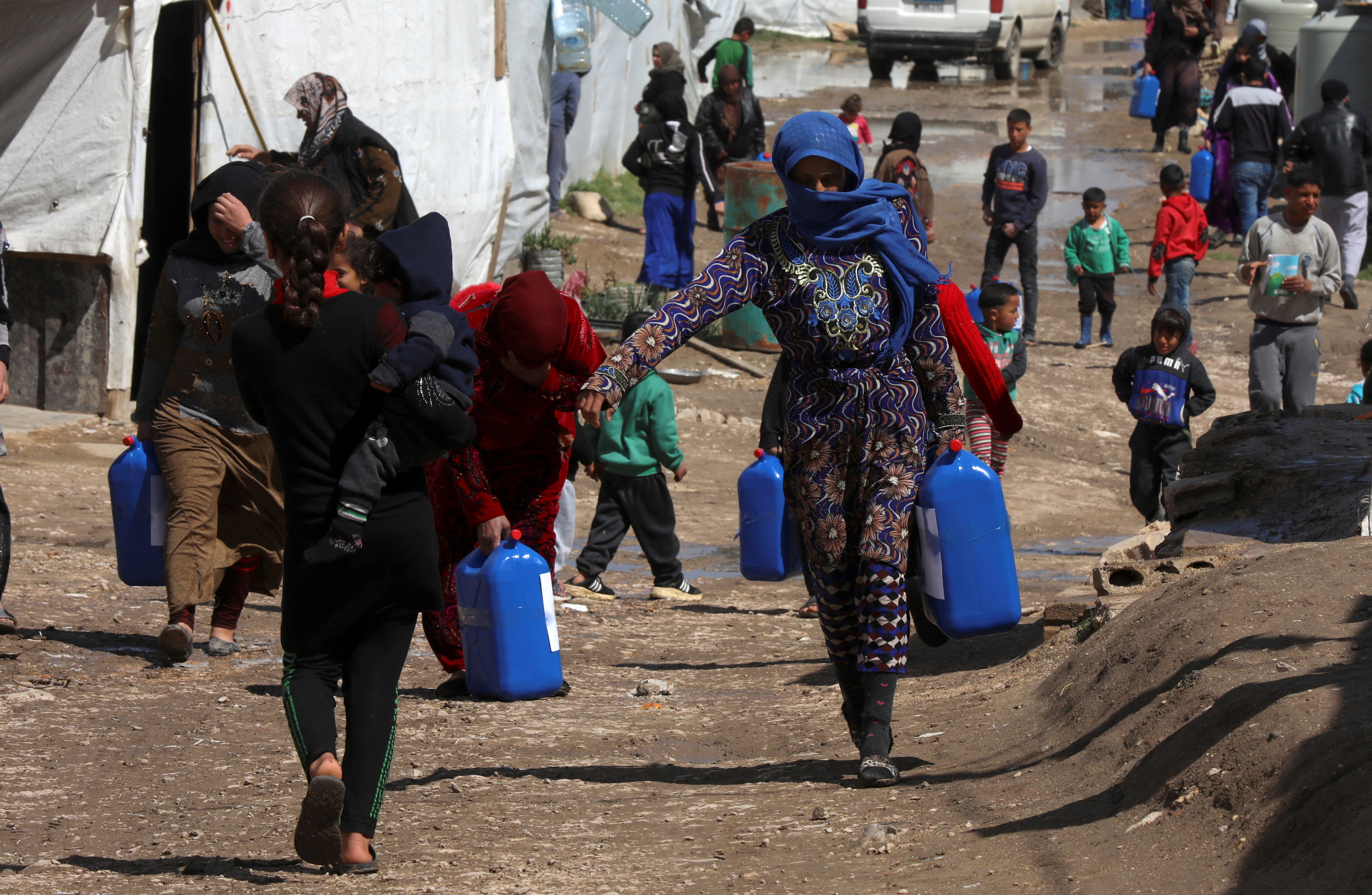More than 5 million Syrian refugees mostly in Lebanon and Turkey and millions more displaced internally have little prospect of returning home
The European Union will convene donors next week to keep Syria on the global agenda, but as the economic and social burden of refugees on neighbouring countries mounts the bloc is divided and unable to find solutions to tackle the issue, diplomats say.
Syria has become a forgotten crisis that nobody wants to stir amid the war raging between Israel and Islamist Palestinian militants Hamas and tensions growing between Iran and Western powers over its regional activities.
More than 5 million refugees mostly in Lebanon and Turkey and millions more displaced internally have little prospect of returning home with political stability no closer than since the uprising against President Bashar al-Assad’s rule began in 2011.
Funding to support them is dropping with the likes of the World Food Programme reducing its aid. Difficulties to host refugees are surfacing, notably in Lebanon, where the economic situation is perilous and a call to send Syrians home is one of the rare issues that unites all communities.
“We have no levers because we never resumed relations with the Assad regime and there are no indications anybody really will,” said a former European envoy to Syria.
“Even if we did, why would Syria offer carrots to countries that have been hostile to him and especially taking back people who opposed him anyway.”
Major European and Arab ministers along with key international organisations meet for the 8th Syria conference next Monday, but beyond vague promises and financial pledges, there are few signs that Europe can take the lead.
The talks come just ahead of the European elections on June 6-9 in which migration is a divisive issue among the bloc’s 27-member states. With far-right and populist parties already expected to do well, there is little appetite to step up refugee support.
The conference itself has changed from eight years ago. The level of participation has been downgraded. The likes of Russia, the key actor backing Assad, is no longer invited after its invasion of Ukraine. The global geopolitical situation and drop in the conflict’s intensity keeps it off radars.
Gulf Arab states, which once contributed handsomely, appear disinterested, offering few – none in 2023 – commitments, though unlike their European partners, some have re-engaged with the Assad government given the realities on the ground.
There are divisions within the EU on the subject. Some countries such as Italy and Cyprus are more open to having a form of dialogue with Assad to at least discuss possible ways to step up voluntary returns in conjunction with and under the auspices of the United Nations.
However, others, like France which acknowledges the pressure the refugees are weighing on Lebanon and fears broader conflict between Iran-backed Hezbollah and Israel, remain steadfast that there can be no discussion with the Assad regime until key conditions are met.
DEPORTATION TO EU MIGRATION
But the reality on the ground is forcing a discussion on the issue.
Demonstrating the tensions between the EU and the countries hosting refugees, Lebanese MPs threatened to reject the bloc’s 1 billion euro package announced earlier this month, slamming it as a “bribe” to keep refugees in limbo in Lebanon instead of resettling them permanently in Europe or sending them back home to Syria.
Caretaker Prime Minister Najib Mikati, who unlike in previous years is not due to attend the Brussels conference, has said that Beirut would start dealing with the issue itself without proper international assistance.
The result has been an upswing in migrant boats from Lebanon to Europe, with nearby Cyprus and increasingly Italy, too, as the main destinations, prompting some countries to ring alarm bells fearing a flood of new refugees into the bloc.
“Let me be clear, the current situation is not sustainable for Lebanon, it’s not sustainable for Cyprus and it’s not sustainable for the European Union. It hasn’t been sustainable for years,” Cypriot President Nikos Christodoulides said this month during a visit to Lebanon.
Highlighting the divisions in Europe, eight countries – Austria, Czech Republic, Cyprus, Denmark, Greece, Italy, Malta and Poland – last week issued a joint statement after talks in Cyprus, breaking ranks with the bloc’s previous positions.
They argued that the dynamics in Syria had changed and that while political stability did not exist yet, things had evolved sufficiently to “re-evaluate the situation” to find “more effective ways of handling the issue.”
“I don’t think there will be a big movement in terms of EU attitude, but perhaps some baby steps to engage and see if more can be done in various areas,” said a diplomat from one of the countries that attended the talks in Cyprus.
Another was more blunt.
“Come Tuesday Syria will be swept under the carpet and forgotten. The Lebanese will be left to deal with the crisis alone,” said a French diplomat.







Click here to change your cookie preferences